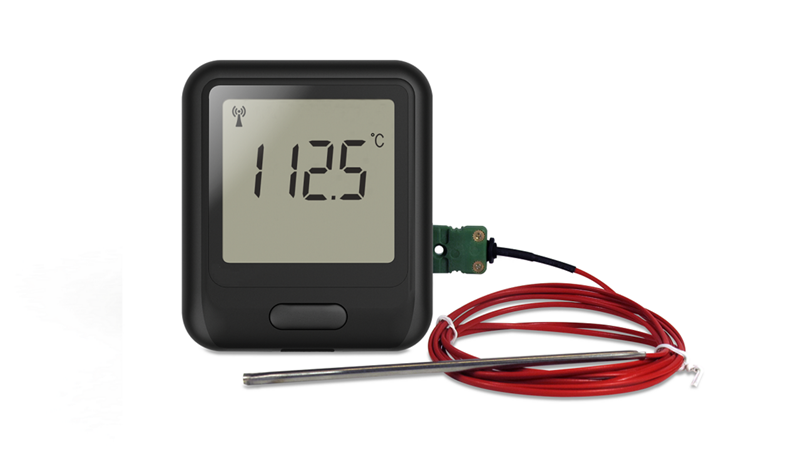WiFi Vaccine Data Loggers and Why They Are Essential
Safely handling and administering vaccines can be tricky business, and the CDC has several rules and guidelines that must be used to keep your vaccines, and your patients safe.
Why use a WiFi Vaccine Data Logger?
Unlike a regular thermometer, WiFi Vaccine Data Loggers provide the most accurate information on vaccine temperatures. The CDC recommends using a digital buffered temperature sensor that measures the actual temperature of the vaccine, while standard thermometers record ambient air temperature that can vary significantly within storage. Using our web software, our WiFi Vaccine Data Loggers allow you to set the minimum and maximum temperatures according to the CDC guidelines and automatically upload temperature data to the Cloud to meet reporting requirements. More importantly, our WiFi Vaccine Data Loggers have a visual, audible alarm that can be set to also notify you immediately on your mobile phone or device if your vaccine temperatures are out of range.
How are WiFi Vaccine Data Loggers saving Lives?
When vaccine temperatures reach unsafe levels, they can lose potency and therefore may not effectively protect your patient. According to the CDC, an out-of-range temperature reading should prompt immediate action. With the WiFi TPX+ data logging unit, alerts can be quickly communicated to the managing staff, including pharmacists and managers who can take action to preserve inventory. It provides a crucial difference between instant notifications and post-event notifications of temperature incursions in days or weeks. This can mean the difference between the safe delivery and administration of a vaccine, or thousands of dollars of product waste, failed regulatory inspections and, most importantly, failed patient care.
Supply Link Inc. offers various types of data loggers for vaccine temperature regulation. Be sure to check out our products.

How to choose the right Vaccine Data Logger for you
There are several features that the CDC recommends looking for in a good data logger. They suggest data loggers with audible alarms, low battery indicators, calibrated to within 0.5 degrees Celsius (certified with traceability and calibration certificates), programmable logging interval of 10 minutes or less, at least 1 month of data storage, and a data cycle when the memory becomes full. Calibration tests should be performed annually or as suggested by the manufacturer to ensure accuracy according to national standards. A good Vaccine Data Logger will have all of these features, and then some.
Our WiFi Vaccine Data Loggers go above and beyond the average features, so you can spend more time on other important aspects of your practice. There is no need to unplug the data logger to upload temperatures, or spend time studying the logs for incursions. We know that all devices that monitor temperatures can wear down over time with constant use, however our WiFi Vaccine Data Loggers are more easily maintained. Because temperatures are automatically saved to the Cloud, there is less physical handling of the unit.
Our WiFi Vaccine Data Loggers save you time and effort on calibrations. When your unit is due for calibration, you simply order a new calibrated probe a week or two before your calibration deadline. We send you a new calibrated WiFi probe to simply replace the old probe. There is no more boxing up your unit, shipping it out, and waiting for it to be returned.
The Importance of Vaccine Data Loggers
Some vaccines and medications compromise their safety when exposed to inappropriate temperature fluctuations. For example, overheated pharmaceuticals promote the growth of pathogens, and freezing reduces the effectiveness of formulations containing protein.
Losing the efficacy of medicine, especially vaccines that put people at risk of
life-threatening infectious diseases, puts public health at risk. Unfortunately, errors in temperature monitoring result in costly revaccination for many patients and significant financial losses due to wasted vaccines. The temperature monitoring methods used in many safety initiatives, such as intermittent readings, manual data entry, paper reporting, and inefficient exchange methods, are outdated.
10 Facts about Vaccine Data Loggers and Proper Uses
- Any facility that will store vaccines must have reliable refrigeration facilities. All refrigeration units must have properly calibrated temperature measurement and control units, as in Digital Data Loggers.
- Vaccine Data loggers are so important that the CDC has included them in their recommendations for proper equipment. You can set your WiFi Vaccine Data Logger to certain minimum and maximum temperature controls to ensure your vaccines are in the proper temperature range at all times. Modern refrigeration units are somewhat reliable, but the fragile nature of the vaccine requires additional precautions. We provide several cold storage solutions on our website, including Panasonic medical grade refrigerators and freezers.
- The WiFi data logger records the data and then automatically uploads it to the Cloud. There are other options for data loggers, such as the USB vaccine data logger, however those units must be unplugged from the probe and connected to a computer to upload temperature data. Whichever you choose, this provides a comprehensive record of refrigerator temperature history in clear and simple graphs. The WiFi data logger in particular is equipped with indicators (visual and audible alarm, instant notifications to a phone or personal device) to indicate when the temperature has reached unacceptable levels.
- The importance of high-temperature data logger technology begins in the manufacturing process but continues throughout the life of vaccines and heat-sensitive drugs.
- Vaccine storage and cold chain guidelines state that vaccines must be shipped and stored within the manufacturer’s recommended temperature range of +2 to +8°C until administration.
- Because vehicles such as aircraft and trucks are more likely to experience extreme temperatures, the delivery and distribution of vehicles may be the most important periods to monitor with data loggers. Our WiFi data loggers are sufficient for this purpose, as the data is stored on the logger and easily retrieved regardless of the WiFi connection in transport.
- Data loggers have to be located along the vaccines, usually the center of a refrigerator, where the temperature is the most stable.
- Ice build-up must be prevented due to the fact this reduces the effectiveness of the refrigerator. During defrosting, a secondary refrigerator or a permitted cooling container (monitored with another data logger) has to be used to quickly save the vaccines. Supply Link has several cold storage solutions for maintaining and transporting vaccines.
- When packaging and transporting vaccines to outlying clinics, reliable cool packing containers and ice packs from a diagnosed clinical enterprise has to be used. Vaccines should be maintained within authentic packaging, wrapped in bubble wrap, dry ice or different insulation fabric and positioned in a fab container with cooling packs as endorsed by the manufacturers’ instructions.
- Higher temperature accelerates the decline in effectiveness of most vaccines, and freezing can lead to increased reactivity and loss of potency in some. Drug distributors and manufacturers do not accept returns of the vaccine, so vaccines can be wasted if not taken care of properly.
Shop Vaccine Data Loggers
Check our Supply Link's curated inventory of vaccine data loggers






